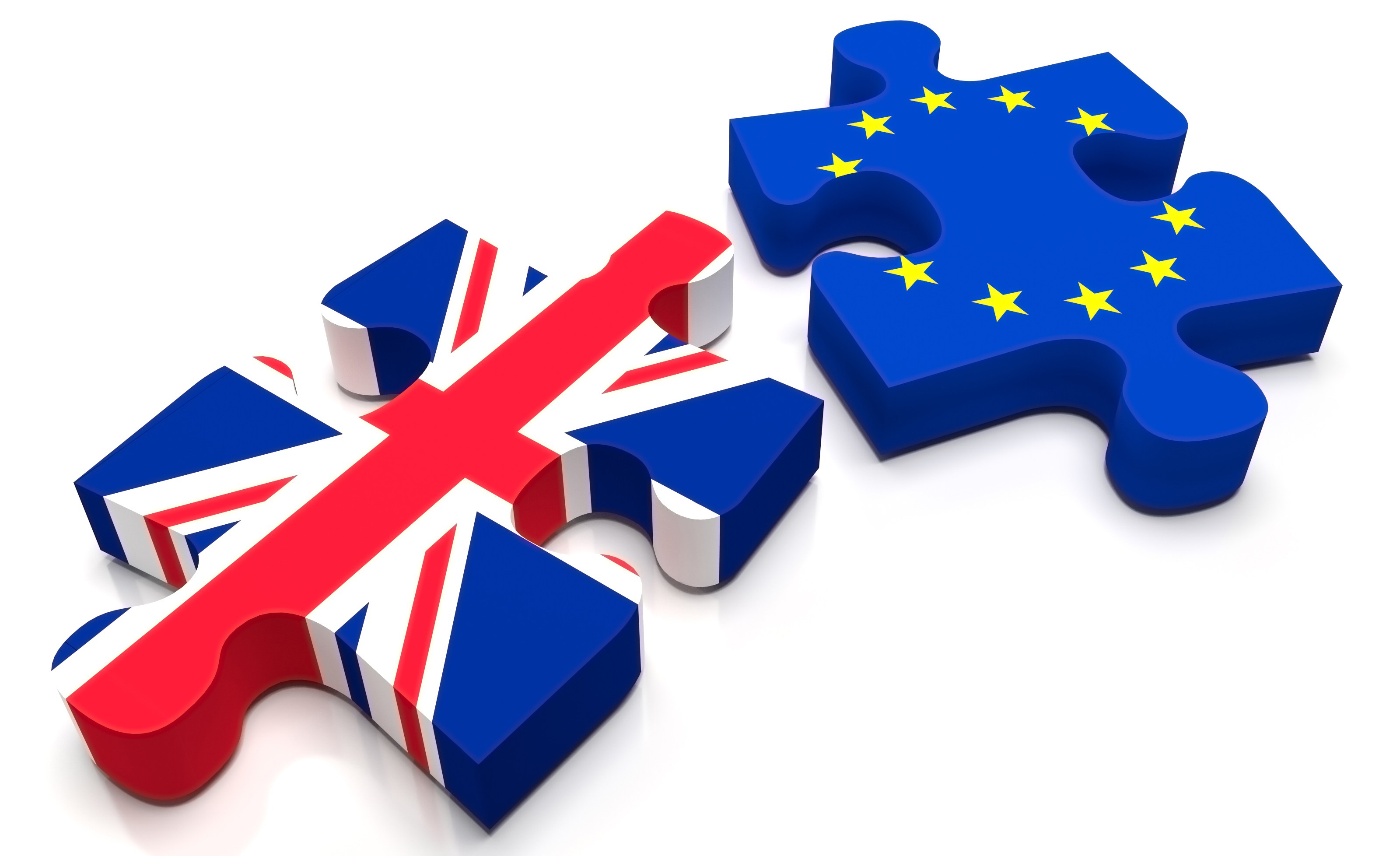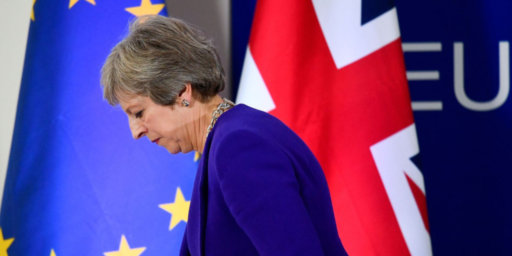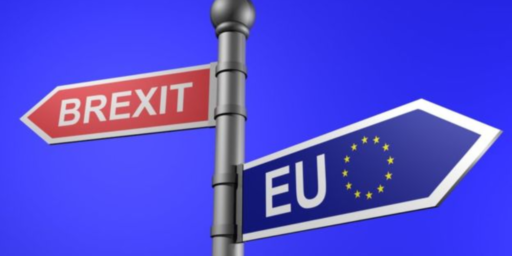European Leaders Approve Final Brexit Deal, But Its Fate In Parliament Remains Unclear
The European Union has approved the final Brexit deal negotiated with Theresa May's government, but the final chapter has yet to be written.

Late last week, the United Kingdom and European Union reached what is supposed to be the final deal on the U.K.’s exit from the E.U., and today that deal was approved by the European Union, but the road ahead in Parliament remains uncertain, as does the future of May’s government:
More than four decades after Britain tied itself to its Continental neighbors, Prime Minister Theresa May obtained the approval of the other 27 European Union members on a formal divorce pact from the bloc, Donald Tusk, the president of the European Council, said on Sunday.
It is a consequential step intended to take the country on a new, if unclear, path.
The journey has been long and tortuous for both sides, and the drama is hardly over. Mrs. May must still get approval for the deal — a dense, legally binding divorce settlement and a set of political promises for Britain’s future relationship with the bloc — from an outspokenly unhappy British Parliament.
Since Britons voted in 2016 to leave the European Union, Mrs. May has struggled to define how closely they should remain tied to Continental Europe, ultimately choosing a kind of middle way that has left many dissatisfied.
With her own Conservative Party deeply divided and the opposition Labour Party promising to vote the deal down, Mrs. May faces what most consider to be an almost impossible task.
But she is dogged, and, with Britain scheduled to leave the European Union on March 29, she appears to be relying on giving legislators a stark choice: her deal or a chaotic exit without any deal.
If she fails, what happens next would be anyone’s guess. Mrs. May could face a leadership challenge or be left to put her deal to a second vote in the British Parliament. There could be a push for a softer Brexit, new elections or a second referendum. Or Britain could lurch toward a no-deal Brexit, an outcome no one wants on either side of the Channel.
In an open letter to the nation, Mrs. May said she would campaign “heart and soul” to get the deal approved. “It will be a deal that is in our national interest — one that works for our whole country and all of our people, whether you voted Leave or Remain,” she said.
Even as the 27 other leaders of the European Union put their imprimatur on the agreement, they were eager to do nothing to make Mrs. May’s task any harder. They, like much of the British public, are heartily sick of Brexit, and Europe has other challenges to deal with, including migration and populism, Russian aggression and the Italian budget threat to the euro.
Antonio Tajani, the president of the European Parliament, bemoaned that Brexit was happening at all.
“Today is not a good day,” he said, adding, “But after long consideration, we believe the agreement is a good one.”
Several European leaders warned on Sunday that negotiations could not be reopened should the British Parliament reject the deal.
“This is the deal,” said Jean-Claude Juncker, the president of the European Commission, the bloc’s executive arm. “It’s the best deal possible. The European Union will not change its fundamental position.”
But Mr. Juncker, too, said to the news media, ”It’s not a moment for jubilation nor celebration; it’s a sad and tragic moment.”
He said he believed that Mrs. May would succeed in getting the British Parliament to approve the deal, but would not speculate on what might happen if she could not.
Prime Minister Mark Rutte of the Netherlands, whose country is one of Britain’s closest trading partners, also expressed confidence that Mrs. May would succeed in persuading Parliament to pass the deal. But asked if the bloc might make more concessions, he warned: “This is the maximum we can all do.”
Britain’s break with Europe was never going to be easy. Even if Britain ratifies the deal, the end of March will see the beginning of many months, possibly years, of negotiations on its future relationship — from trade and travel to security and intelligence.
European officials have been eager to try to help Mrs. May get the deal ratified by embracing language in the political declaration about Britain’s long-term ties with the bloc, which will be closer and of a different kind than any other third country.
Britain’s allies, including the Netherlands, pressed hard for a reference in the declaration to “an ambitious, broad, deep and flexible partnership across trade and economic cooperation, law enforcement and criminal justice, foreign policy, security and defense and wider areas of cooperation.”
They hoped to describe a close relationship that went far beyond a trade deal of the kind the bloc has negotiated with Canada and Japan.
But to British critics, the proposals represent the worst of all worlds, a Britain that is neither in, nor fully out, of the European Union. If negotiations fail to produce a good outcome, they fear that Britain could be trapped in Europe’s orbit, obliged to obey rules for years to come without the ability to shape them or cut its own trade deals around the globe.
(…)
Britain joined the European Union’s forerunner in 1973 and embarked, often grudgingly, on a process of integration that accelerated from the mid-1980s. Economic rules are now so intertwined that the former director-general of the World Trade Organization, Pascal Lamy, has likened Brexit to removing an egg from an omelet.
But Britain was always hesitant — or outright resistant — to pooling sovereignty with a group of Continental countries that joined together after World War II, from which the British emerged victorious.
“Brexit is probably a bigger break for Britain than for the European Union, as the perception from the Continent has always been that Britain was somewhat aloof and detached and closer to the U.S. than Europe,” said Holger Nehring, professor of contemporary European history at the University of Stirling.
The Washington Post has more, including a more detailed look at the difficulties that May faces in Parliament, where she hopes to get the agreement approved before the end of the year:
European leaders on Sunday signed off on their split from Britain, approving a deal that would set the United Kingdom on a new road, independent from the European Union after more than four decades of membership in the political and economic powerhouse.
The agreement — “historic,” according to German Chancellor Angela Merkel — will cut Britain out of the European Union, marking the first time a nation has ever sought to depart. But the deal must still weather Britain’s political storms ahead of the official March 29 exit date, with the key test next month when the U.K. Parliament puts it to a vote amid violent opposition.
No matter the uncertainty in Britain, it was a momentous occasion in Britain’s 45-year-long membership in the European club and its torturous two-year effort to depart it.
The deal will almost certainly come with steep costs for both sides, leaving leaders in the extraordinary position of negotiating a split that they almost all believe will harm their citizens. Some E.U. leaders said they felt Sunday’s deal was a tragedy. The deal, approved unanimously Sunday by the remaining 27 E.U. leaders, would leave Britain in legal limbo — obligated to follow most E.U. rules but no longer a member — until the end of 2020, as leaders haggle over the relationship to come. The assent came after less than an hour of discussion.
“Today has been a historic day,” Merkel said after the meeting, a rare and unusual gathering of European leaders on a chilly Sunday morning in Brussels. “My feelings are very divided. I feel very sad, but at the same time I feel a sense of relief.”
British Prime Minister Theresa May, asked if she shared the unhappiness, said, ”No, but I recognize that others do.”
(…)
May’s headaches are far from over. Her limits as vote-wrangler will be tested in her own Parliament, where pro-Brexit lawmakers have hammered the plan as failing to break decisively enough from Brussels and pro-E.U. forces have condemned it as a self-inflicted wound that hurts British voters.
According to the British press, as many as 90 lawmakers of May’s own Conservative Party have said they plan to vote against it, alongside members of the opposition Labour Party.
(…)
Boris Johnson, the former foreign secretary and lead campaigner for Brexit, said on Saturday that Britain was “on the verge of a historic blunder.” He said May’s withdrawal deal surrenders too much power to Brussels.
What will happen to the withdrawal agreement if it is voted down by the British Parliament is unclear. May could put it up for a vote again. She could face a leadership challenge or new elections. Britain could even re-run their referendum, although few analysts believe this is realistic. Brexiteers want negotiators to return to Brussels to amend the deal, but European leaders have said that they have little room to improve it and that there is nothing more to talk about. They advised British lawmakers to take what is on the table.
The disagreements have left the two sides staring into the abyss, as British opponents to the deal say they want to come up with something better. E.U. leaders say the alternative is a chaotic no-deal departure — a development that could ignite economic crisis and could even lead to shortages of medicine in Britain.
Even with this agreement, there are several side issues that remain unresolved, both of which involve areas where British territory shares a physical border with nations that are part of the European Union. The biggest outstanding issue, of course, and one that has been the subject of much debate between the parties, as well as in London and Dublin, is the effort to maintain something resembling the free access border between Northern Ireland and the Republic of Ireland that has proven to be an essential part of the agreement that has kept the peace in that region for two decades. Rather than coming up with a solution, the agreement provides that if the parties fail to do so before the end of the transition period then the U.K. will be obligated to remain with the E.U.’s customs union and would be required to respect most to the European Union regulations regarding goods that pass between Northern Ireland and the Irish Republic. Another side issue deals with the of the border between Spain and the British territory of Gibraltar. Spain has insisted, though, that the issues regarding Gibraltar be dealt with in bilateral talks between the two nations. In addition to this, even after Brexit would become official in March of next year there would remain a number of technical issues that would need to be resolved between the U.K. and the E.U., as well as the question of the future trade relations between the two entities. Broadly speaking, though, after the hard Brexit deadline the more than four-decade relationship between the United States and the European Union would effectively come to an end.
All of this depends, though, on the deal that May and her team have negotiated with Brussels being approved by Parliament. As I’ve noted in several recent posts, this is by no means certain and the prospect that the entire battle could lead to the collapse of May’s government remains strong. While the Conservative and Labour parties are officially both in favor of Brexit, there are considerable numbers of “Remainers” in both parties, and the Scottish National Party remains strongly opposed to leaving the E.U. Even among supporters of Brexit, there have already been complaints about the terms of the deal among supporters of leaving the European Union who see the terms of the deal that May has negotiated as not being radical enough. Whether this ends up being a sufficient force to block approval of the deal, something that the May government hopes to accomplish before the end of the year.
If the Brexit deal does fail to get Parliamentary approval, then it likely will put May’s government in the spotlight. In such an event, the odds are the May herself would likely be required to step aside as leader of the Conservative Party since such a loss would constitute a massive political setback that she would be unlikely to recover from. Additionally, a loss in Parliament could lead to a no-confidence vote in the House of Commons that could lead to the necessity for new elections. Even those events, though, won’t stop Brexit from happening. The break is coming, and it will happen in March 2019 whether this deal happens or not. The only thing that could stop it from happening is a course of events that, as the day grows closers, seem less and less likely to occur.





The UK picked a fight with a bigger, stronger opponent. That opponent has agreed to let the UK up off the mat with only cuts, bruises, a few mild concussions and complete humiliation. But never underestimate the British talent for presenting catastrophe as a moral victory. Dunkirk, anyone?
Most of the commentators over at the Telegraph are in hysterics about how Theresa May is a “TRAITOR!!!” and unless this deal is voted down by the Tories they’ll never ever ever vote Tory again. Repeat, rinse, repeat.
They’re also perfectly convinced that WTO-only is just dandy, that as soon as the U.K. sets out on its little lonesome voyage the rest of the world will be slavering to sign up with wonderful trade agreements that will give the U.K. all it wants, that the Commonwealth countries are just looking forwards to signing up in a new glorious Commonwealth (with the U.K. at the top, of course), and that the EU will immediately turn around and come back for a renegotiation, tail between its legs.
They also keep harping on the U.K. as “being the 5th largest economy in the world!!!” even though it’s just one teensy point ahead of France and if the pound drops any more it’s more likely to be….7th. (If there’s a hard Brexit there’s no way that the U.K. will remain in 5th place.)
I’m starting to wonder if the EU isn’t expecting the U.K. to drop out, period. After the U.K. goes over the cliff and has to deal with a few weeks of no food, no air freight, and rolling blackouts (a lot of the energy the U.K. uses comes from abroad) a lot of the “I am U.K. hear me roar!” silliness should stop. Of course, a sizeable percentage of the population will probably refuse to admit that their own stupidity got them into this mess and will be running around looking for scapegoats to string up. If it looks like the U.K. is going for a No Deal Brexit I’d get out of town ASAP if I looked non-Saxon.
Oh well. Stupidity should hurt, and it looks like the Brits are going to have to learn the intricacy of how international trade works the hard way.
Good article showing how the Brits totally miscalculated the EU reaction.
Basically, the Brits are floundering because they want a cookie AND cherries AND a cake and mom has already said: you only get one and stop whining.
It’s as though they’ve agreed to commit suicide, and are arguing because some want shoot themselves with a bigger caliber.
@grumpy realist: Bumped into a bit of the Brexiter froth and fury on a YouTube of Irish music. Quite a bit of ‘how do you hold your head up when those EU arsholes are tellin’ you how to fix your porridge!?’ Of course, Ireland was notable for it’s poverty before the EU came along and some remember ‘the Troubles’. It reminded me a lot of that Monty Python scene ‘What Did the Romans Ever Do For Us?’
@JohnMcC: And a lot of them are in fits over the fact that the Republic of Ireland is holding firm on the backstop and insisting that the GFA be respected. The fact that the ROI isn’t interested at all in following the U.K. out of the EU is seen as A Great Betrayal.
As things stand there’s no way this gets through Parliament.
The DUP hate it and their 10 votes are enough to defeat it, assuming the Opposition parties don’t fragment.
Besides the DUP, the hardcore Conservative Brexiters despise this deal as well (in fact generally Brexiters dislike the deal even more than Remainers do). And I’d guess the ERG can muster at least 20 solid Noes.
So, even if May can keep Tory Remainers on board the deal falls.
Actually Con-Remain have more grounds to oppose the May deal than the ERG screaming nutcases, but as the ERG are
a) nutcases and
b) screaming
they remain central to the intra-Conservative psycho- drama. (Emphasis on psycho).
Irresistible force meets immovable object.
Looks like May’s tactics will be sit tight, crank up the pressure and wait for opposition to implode
(oh, and to offer the DUP bribes that would make a sheikh blush).
Pity the economy may implode first, but so it goes.
Speaking of the economy here’s a link to an FT article: $1 trillion moved out of UK focused equity funds since 2016.
And nobody’s even beginning to really analyse the potential secondary and tertiary tier impacts yet.